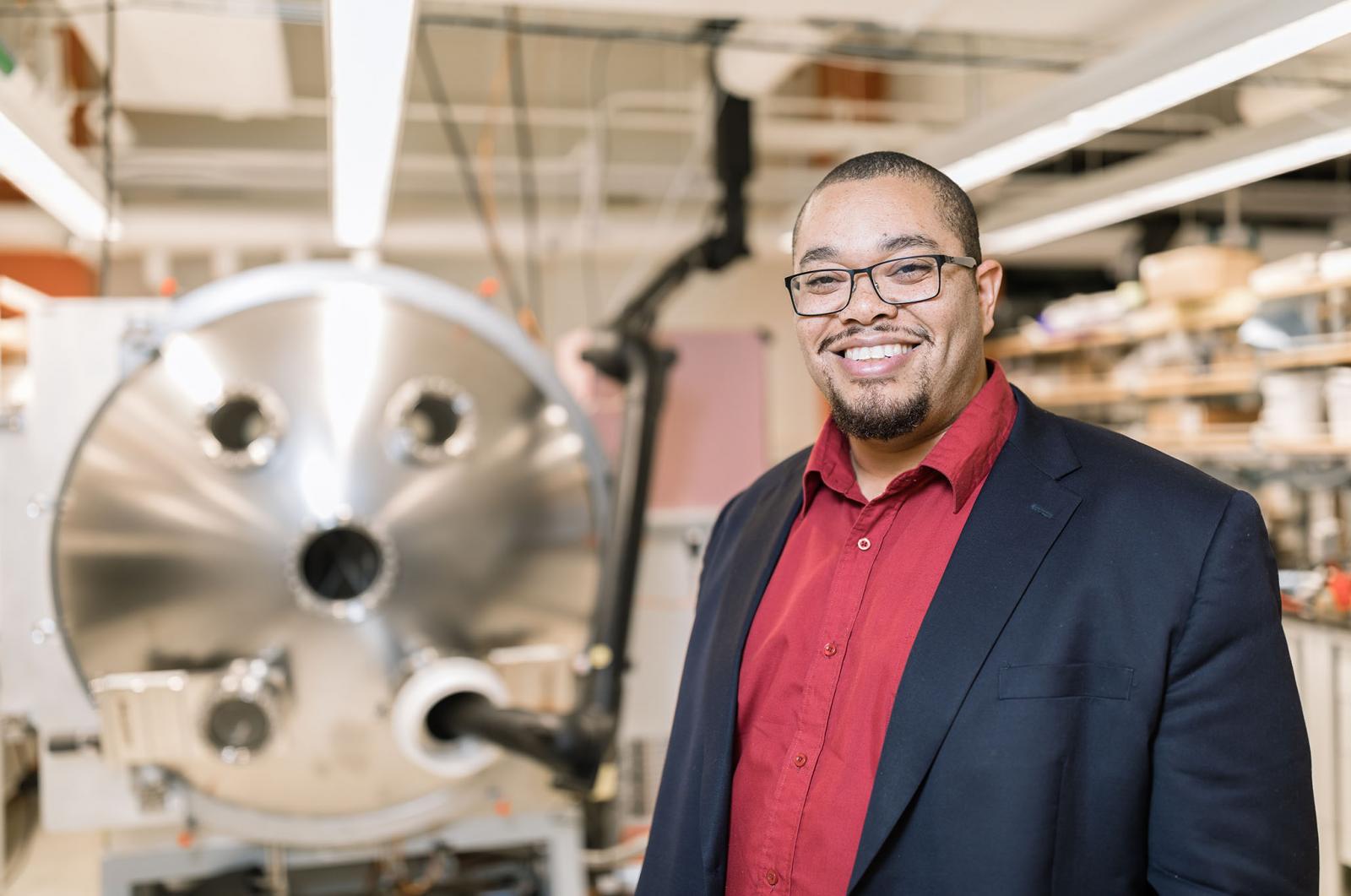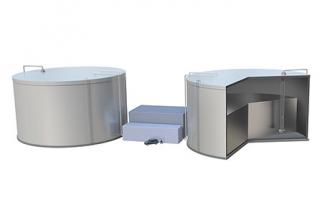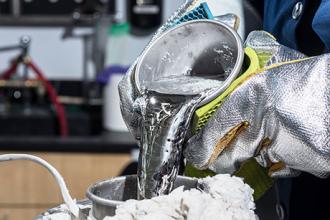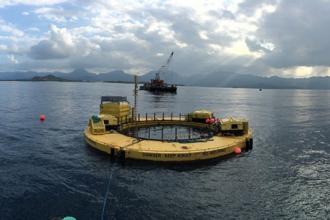
Professor
Asegun Henry
Interests
- Heat Transfer
- Energy storage and conversion
- Phonon transport
Professor Henry News + Media

“Sun in a box” would store renewable energy for the grid
Associate Professor Asegun Henry's new design stores excess heat generated by solar or wind power as white-hot molten silicon, and then converts the light from the glowing metal back into electricity on demand.

Tackling Greenhouse Gases
Faculty in MIT's Department of Mechanical Engineering are developing technologies that store, capture, convert, and minimize greenhouse gas emissions using a variety of approaches.

The race to develop renewable energy conversion and storage technologies
Researchers across MIT’s Department of Mechanical Engineering are racing to develop energy conversion and storage technologies from renewable sources such as wind, wave, solar, and thermal.
Faculty Details
Education
-
2004
FLORIDA A&M
B.S. -
2006
MASSACHUSETTS INSTITUTE OF TECHNOLOGY (MIT)
M.S. -
2009
MASSACHUSETTS INSTITUTE OF TECHNOLOGY (MIT)
Ph.D.
Research Interests
Novel energy system concepts that help to mitigate the effects of climate change, including solar energy, energy storage, and transportation. Concepts currently under development include thermal energy grid storage using multi-junction photovoltaics (TEGS-MPV), high temperature concentrated solar power (CSP) using liquid metals or molten salts, ceramic/refractory based fluid handling infrastructures, high temperature thermochemical energy conversion and reactor design, methane pyrolysis for hydrogen production, solar fuels, direct contact heat exchangers; Atomistic level modeling to study the fundamental physics of phonon transport in ordered materials, disordered materials, molecules and at interfaces; Molecular dynamics (MD) simulations, supercell lattice dynamics calculations, first principles calculations, density functional theory (DFT), interatomic potentials optimized for describing phonons directly from first principles, Taylor expansion based potentials and neural network potentials.
Bio
Dr. Asegun Henry started as an Associate Professor in the Department of Mechanical Engineering at MIT in 2018, where he directs the Atomistic Simulation & Energy (ASE) Research Group. Prior to MIT, he was an Assistant professor in the Woodruff school of Mechanical Engineering at Georgia Tech from 2012 to 2018. He holds a B.S. degree in Mechanical Engineering from Florida A & M University as well as a M.S. and Ph.D. in Mechanical Engineering from MIT. Professor Henry’s primary research is in heat transfer, with an emphasis on understanding the science of energy transport, storage and conversion at the atomic level, along with the development of new industrial scale energy technologies to mitigate climate change. After finishing his Ph.D. he worked as a postdoc in the Materials Theory group at Oak Ridge National Laboratory (ORNL) and then as postdoc in the Materials Science Department at Northwestern University. After Northwestern, he worked as a fellow in the Advanced Research Projects Agency – Energy (ARPA-E), where he focused on identifying new program areas, such as higher efficiency and lower cost energy capture, conversion and storage. Professor Henry has made significant advances and contributions to several fields within energy and heat transfer, namely: solar fuels and thermochemistry, phonon transport in disordered materials, phonon transport at interfaces, and he has developed the highest temperature pump on record, which used an all-ceramic mechanical pump, to pump liquid metal above 1400°C. This technological breakthrough, which is now in the Guinness Book of World Records, has opened the door for new high temperature energy systems concepts, such as methane cracking for CO2 free hydrogen production and a new grid level energy storage approach affectionately known as “Sun in a Box”, that is projected to be cheaper than pumped hydro. Professor Henry has also been the recipient of a number of awards including: the National Science Foundation Career Award, the Lockheed Inspirational Young Faculty Award, the Georgia Power Professor of Excellence Award, the ASME Bergles-Rohsenow Young Investigator Award in Heat Transfer and he was the winner of the 2018 World Technology Award for Energy. He has also been awarded a number of fellowships including an MIT Lemelson Presidential Fellowship, a Department of Energy Computational Science Graduate Fellowship, a UNCF-Merck Postdoctoral Fellowship and a Ford Foundation postdoctoral Fellowship.
Honors + Awards
- 2023 The Alan T. Waterman Award - NSF
- 2022 Physics World Top 10 Breakthroughs: Super-efficient electricity generation
- 2021 Bell Labs Prize Winner
- 2018 ASME Bergles-Rohsenow Young Investigator Award in Heat Transfer
- 2018 World Technology Award – Energy
- 2018 FAMU/FSU Mechanical Engineering Rising Star Alumni Award
- 2017 Georgia Power Professor of Excellence Award
- 2016 National Science Foundation – CAREER Award
- 2015-2016 Lockheed Inspirational Young Faculty Award
- 2010-2011 Ford Foundation Postdoctoral Fellowship
- 2009-2010 UNCF-MERCK Postdoctoral Fellowship
- 2005-2009 DOE – Computational Science Graduate Fellowship
- 2004-2005 MIT – Lemelson Presidential Fellowship
- 2000-2004 FAMU – Distinguished Scholars Award
- 2002-2004 FAMU – Pi Tau Sigma Mechanical Engineering Society
- 2001-2004 FAMU – Tau Beta Pi Engineering Honors Society
Memberships
- American Society of Mechanical Engineers
- Materials Research Society
- American Physical Society
- American Ceramic Society
Teaching
2.005 Thermal Fluids Engineering
2.55 Advanced Heat and Mass Transfer.
Publications
- Book Chapter: A. Henry, Thermal Transport in Polymers, Invited chapter in the Annual Review of Heat Transfer, Chapter 13, Volume 17 485-520 (2013)
- Papers:
- A. Henry and G. Chen, Spectral Phonon Transport Properties of Silicon Based on Molecular Dynamics Simulations and Lattice Dynamics, J. Comput. Theor. Nanosci., 5, 141-152 (2008).
- A. Henry and G. Chen, High Thermal Conductivity of Single Polyethylene Chains Using Molecular Dynamics Simulations, Phys. Rev. Lett., 101, 235502 (2008).
- A. Henry and G. Chen, Anomalous heat conduction in polyethylene chains: Theory and molecular dynamics simulations, Phys. Rev. B, 79, 144305 (2009).
- S. Shen, A. Henry, J. Tong, R. Zheng, G. Chen, Polyethylene nanofibres with very high thermal conductivities, Nature Nanotechnology, 5, 251 - 255 (2010).
- V. Singh, T. L. Bougher, A. Weathers, Y. Cai, K. Bi, M. T. Pettes, S. A. McMenamin, W. Lv, D. P. Resler, T. R. Gattuso, D. H. Altman, K. H. Sandhage, L. Shi, A. Henry and B. A. Cola, High Thermal Conductivity of Chain-Oriented Amorphous Polythiophene, Nature Nanotechnology, 9, 384-390 (2014).
- A. Henry, R. Prasher, The Prospect of Solid State Energy Conversion to Reduce the Cost of Concentrated Solar Power, Energy & Environmental Science, 7, 1819-1828 (2014).
- K. Gordiz, A. Henry, A formalism for calculating the modal contributions to thermal interface conductance, New Journal of Physics, 17, 103002 (2015).
- C. Yuan, C. Jarrett, W. Chueh, Y. Kawajiri, A. Henry, A New Solar Fuels Reactor Concept Based on a Liquid Metal Heat Transfer Fluid: Reactor Design and Efficiency Estimation, Journal of Solar Energy, 122, 547-561 (2015).
- K. Gordiz, A. Henry, Examining the Effects of Stiffness and Mass Difference on the Thermal Interface Conductance Between Lennard-Jones Solids, Scientific Reports, 5, 18361 (2015).
- Z. Liu, Y. Liu, Y. Chang, H. R. Seyf, A. Henry; A. L. Mattheyses, K. Yehl, Y. Zhang, Z. Huang, K. Salaita, Nanoscale Optomechanical Actuators for Controlling Mechanotransduction in Living Cells, Nature Methods, 13, 143-146 (2016).
- C. Jarrett, W. Chueh, C. Yuan, Y. Kawajiri, K. H. Sandhage, A. Henry, Critical Limitations on the Efficiency of Two-Step Thermochemical Cycles, Journal of Solar Energy, 123, 57-73 (2015).
- W. Lv, A. Henry, Direct Calculation of Modal Contributions to Thermal Conductivity via Green-Kubo Modal Analysis: Crystalline and Amorphous Silicon, New Journal of Physics, 18, 013028 (2016).
- K. Gordiz, A. Henry, Phonon Transport at Interfaces: Determining the Correct Modes of Vibration, Journal of Applied Physics, 119, 015101 (2016).
- K. Gordiz, A. Henry, Phonon Transport at Crystalline Si/Ge Interfaces: The Role of Interfacial Modes of Vibration, Scientific Reports, 6, 23139 (2016).
- H. R. Seyf, A. Henry, Thermophotovoltaics: a potential pathway to high efficiency concentrated solar power, Energy & Environmental Science, 9, 2654-2665 (2016).
- H. R. Seyf and A. Henry, A method for distinguishing between propagons, diffusions, and locons, Journal of Applied Physics, 120, 025101 (2016).
- A. Rohskopf, H. R. Seyf, K. Gordiz, A. Henry, Empirical Interatomic Potentials Optimized for Phonon Properties, NPJ Computational Materials, 3, 27, (2017).
- W. Lv, R. M. Winters, F. DeAngelis, G. Weinberg, A. Henry, Understanding Divergent Thermal Conductivity in Single Polythiophene Chains Using Green–Kubo Modal Analysis and Sonification, Journal of Physical Chemistry, 121, 30, 5586-5596 (2017).
- H. R. Seyf, L. Yates, T. L. Bougher, S. Graham, B. A. Cola, T. Detchprohm, M-H. Ji, J. Kim, R. Dupuis, W. Lv, A. Henry, Rethinking Phonons: The Issue of Disorder NPJ Computational Materials, 3, 49 (2017).
- C. Amy, D. Budenstein, M. Bagepalli, D. England, A. DeAngelis, G. Wilk, C. Jarrett, C. Kelsall, J. Hirschey, B. Capps, A. Chavan, B. Gilleland, Y. Zhang, C. Yuan, W. Chueh, K. Sandhage, Y. Kawajiri, A. Henry, Pumping Liquid Metal at High Temperatures Up to 1673 kelvin, Nature, 550, 199-203 (2017).
- W. Lv, S. Sultana, A. Rohskopf, K. Kalaitzidou, A. Henry, A Scalable Approach to High Thermal Conductivity Polymer Composites, Composites Part A, 12, 3, 215-226 (2018).
- A. DeAngelis, H. R. Seyf, R. Berman, G. Schmidt, D. Moore, A. Henry, Design of a High Temperature (1,350°C) Solar Receiver Based on a Liquid Metal Heat Transfer Fluid: Sensitivity Analysis, Solar Energy, 164, 200-209, (2018).
- G. Wilk, A. DeAngelis, A. Henry, Estimating the cost of high temperature liquid metal based concentrated solar power, Journal of Renewable and Sustainable Energy, 10, 023705 (2018).